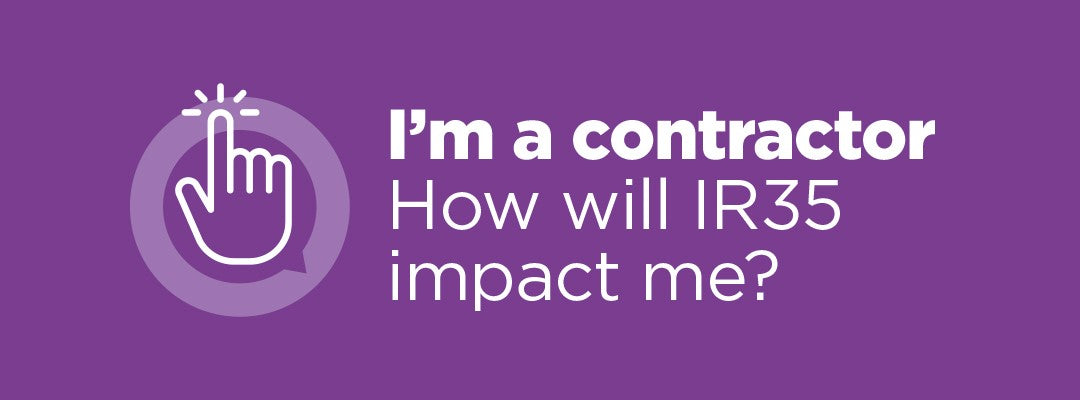
The IR35 ‘off-payroll’ rules will be extended to the private sector from April 2020 onwards, directly affecting a large number of contractors. What exactly does this mean, and what should contractors and clients do to comply with the new legislation?
What are the off-payroll (IR35) rules?
The Intermediaries Legislation – IR35 – has been around since 2000; its core aim is to remove the tax advantages of providing services via a limited company by individuals who are not truly in business on their own account. In other words, the rules are aimed at so-called ‘disguised employees’ – people whose working practices are more akin to those of traditional employees.
Under the current IR35 rules, the intermediary (the contractor’s limited company) is responsible for determining the employment status of its workers.
Due to perceived widespread non-compliance with IR35, in 2017 the Government rolled out ‘off-payroll working’ rules to cover all public sector organisations. Under these new rules the end-client is responsible for determining the employment status of contractors. For example, if your contractor company is engaged by HSBC Bank, it is HSBC who determines the status.
At the 2018 Budget, the Chancellor announced that the rules will be extended to most private sector businesses from April 2020. Only ‘small and medium business’ clients will be excluded.
Under the off-payroll rules, if the end-client deems you to be ‘inside IR35’, the fee-payer in the contractual chain (often a recruitment agency, or client) is responsible for deducting income tax and National Insurance Contributions from the contractor.
The Treasury expects this new measure to net £1.3bn per year by 2023.
How does a client determine my IR35 status?
Under the new off-payroll rules, the end-client will determine whether or not your contract falls within the IR35 net or not.
Using a variety of means, and looking at your contract terms and working practices, the end-client must issue a Status Determination Statement (SDS).
The SDS outlines the end-client’s IR35 status decision and must be provided to both the contractor and the party directly engaging the contractor (often the agent). Until this is provided, then the end-client will remain responsible for collecting income tax and NICs.
The client is obliged to take reasonable care when making this assessment, however we have seen from both the public sector rollout and behaviour preceding the private sector rollout, that many larger clients are simply opting to not use contractors altogether, or making ‘blanket’ inside-IR35 determinations for entire groups of contractors.
If you don’t agree with an IR35 status decision, there is a new client-led disagreement process, which obliges the end-client to review a decision and provide a reasoned response within 45 days. If they fail to do this, then the client (not the agent) will assume the IR35 liability.
What employment status tools are available to clients?
There is an official online status tool, CEST. HMRC has stated that if the tool finds that you are ‘outside IR35’, it will stick by this determination, assuming you have provided accurate information.
Unfortunately, CEST has been widely condemned for ignoring key parts of case law – particularly excluding an important historical employment status factor – the Mutuality of Obligation.
Several commercial providers also offer a wide range of IR35-related support to clients – including IR35 contract reviews and insurance.
What happens if I’m caught by the off-payroll changes?
If your client deems your contract to be outside IR35, then life carries on as normal – you operate via your limited company and pay tax in the same way as any other small company.
If, however, your work is found to be inside IR35, the ‘fee-payer’ (the party closest to your limited company in the chain) is responsible for paying employers’ NICs, and deducting employees’ NICs and income tax from your invoice for services provided, and paying these liabilities to HMRC.
If you are VAT registered, the VAT element is excluded from the tax calculation before being added back on for payment to your limited company.
What are my trading options under the new rules?
Your choices of trading structure are limited by the actions of your end-client, who may decide to no longer engage limited company contractors at all. Or if they do, you may be found to be inside IR35.
Here are your options:
Trade via your limited companyIf you’re caught by IR35, a reputable PAYE umbrella company will act as the intermediary between you and the client (rather than your own limited company). You will be taxed as an employee, however the employers’ NICs must be paid by the umbrella company, and not be deducted from your net pay. This should be accounted for in the gross contract rate you are quoted when joining an umbrella company.
Become a permanent employee
Probably the last resort for contractors – but this may be an option if you don’t have any other choice, especially in the short-term, while the market adjusts to the April 2020 changes.
When do the off-payroll rules take effect?
In the public sector, the rules have been live since April 2017. The private sector extension is set to go ahead from April 2020.
HMRC has confirmed that the rules will only apply to services carried out on or after this date.
So, unless something dramatic happens in the meantime, the off-payroll rules will hit the private sector on 6th April 2020.
The official guidance is here
Always take professional advice when deciding your tax planning or investment strategy. The contents of this article are intended for general information purposes only and shall not be deemed to be or constitute advice. We cannot accept responsibility for any loss as a result of acts or omissions taken in respect of this article.



